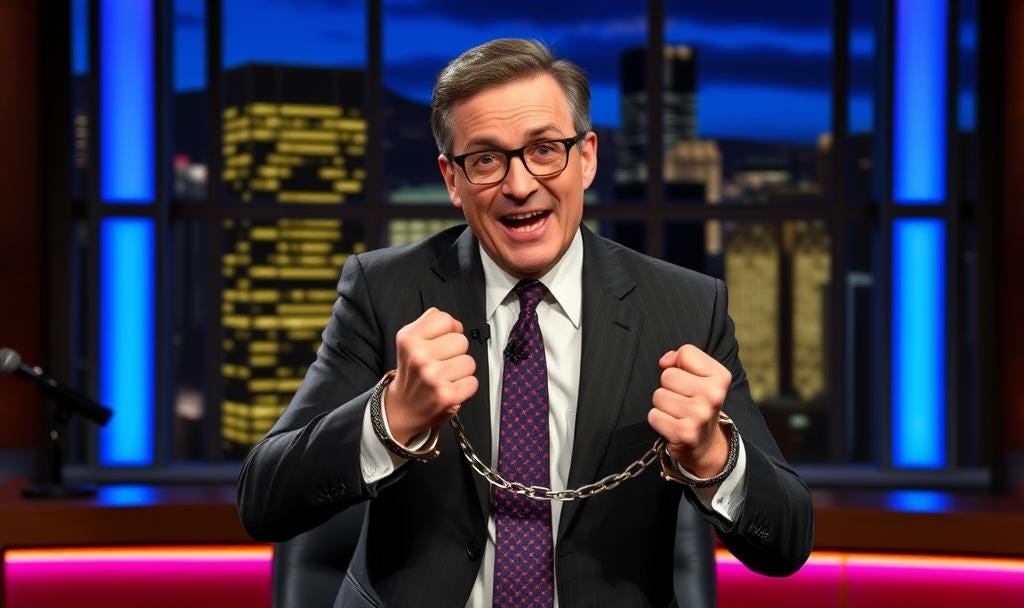Does Jimmy Kimmel's Comedy Qualify as Dissent?
How Civic Discourse is Preconditioned Today and In Previous Eras
The current liberal bête-noire in anti-Trump discourse is the repression of Jimmy Kimmel as late night host in light of a segment mocking the President’s reaction to the death of Charlie Kirk.
There are many questions about who made the decision to suspend Kimmel from primetime and what that means for democratic discourse in the United States. There are a few aspects to consider:
The airwaves in the United States have always been highly regulated and often moralizing when it comes to political issues - one need to look no further than the essential de-personing of Janet Jackson following the “wardrobe malfunction” of Super Bowl 38 (yes I won’t use roman numerals).
Late night TV as a model has become both less popular and less profitable. Johnny Carson at his peak averaged 17 million viewers nightly within a smaller US population. Colbert struggles to get 2.5 million, and has also been canned.
Traditional media brands are often dependent on the consent and discretion of local affiliates and broadcasters, who in number (much like electoral votes) skew more rural and conservative. To many in conservative America, jokes about Charlie Kirk are not what they want to see as either citizens or consumers. Despite this or that offhand comment about MLK, most in that geography view him as a “nice young man” who has been struck down too young.
ABC has been looking for a way out of Kimmel’s contract for at least two years, introducing a slew of guest hosts over the summer which effectively got audiences used to seeing someone else in his slot (what audience was left of course).
When Colbert’s canning was announced, CBS stated that the show runs at a loss exceeding $40 million annually. The hosts are unpopular, the consumer base is tender, and the business model of late night TV has been walking dead for years.
It’s important to understand that late night TV grew out of a time when media choice was very limited - there were for decades only 3 networks, with limited time for adult-oriented content restricted to late-night hours, where now there are thousands of cable channels and millions of podcasts and streamers to choose from, most of whom seem to build their brands on swearing and bawdiness. While many were watching Carson every night, how much attention could we be sure they were paying - perhaps through a drunken stupor at that?
If ABC was looking for an excuse to remove Jimmy Kimmel, they may have picked the wrong one, because it appears exceedingly political. There needs to be moderation in the discourse that his content does not reflect the “national mood” of the country - much the same way that Bill Maher was removed from air for making comments about cowardice less than a week after 9/11.
The trends of social preference swing back and forth as a pendulum, and we have seen in each decade of American life a new energy shifting either left or right, almost entirely dependent on the attitudes of the previous decade and a need to compensate for them. For many, the McCarthyism of the 50s would have been attractive in the wake of massive government growth during the New Deal, and a meaningful threat to the free-enterprise, free-association roots of the American system.
As Barry Goldwater said in the 1964 Presidential campaign, “…extremism in the defense of liberty is no vice… moderation in the pursuit of justice is no virtue!” At that time, Goldwater was painted as a nut for his strong views, but not 2 decades later, his attitudes were showed to have laid the groundwork for the Reagan revolution. Heck, even Hillary Clinton was a “Goldwater Girl”.
If there are concerns about repression of alternatives and dissent, one must look at the history of the United States to understand that it is very much a morass of mob rule - even if its founders were decidedly opposed to it. From a cultural perspective, this is as much the country of Jazz and Baseball as it is of COINTELPRO and MK ULTRA. Lincoln suspended habeas corpus during the Civil War, Wilson introduced the Committee on Public Information (a propaganda bureau) during World War I. US liberalism exists to defend liberty at every turn, but civil rights have always been mutable if the mood of the country was there.
Perhaps in this case, they would have been less at risk if Jimmy Kimmel’s show didn’t suck (ouch!).


